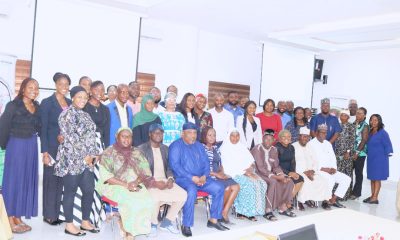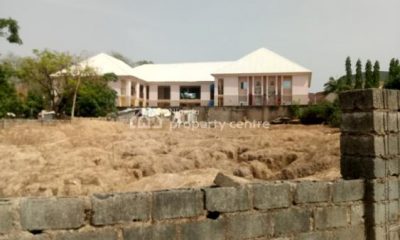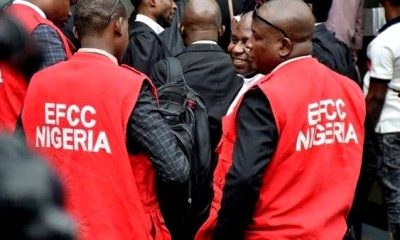Education
Prospects and Challenges of Tertiary Education in Contemporary Nigeria

By Attahiru M. Jega Professor Department of Political Science Bayero University, Kano
The 24th Convocation Lecture, University of Maiduguri, November 16th, 2023
Introduction
Education is, no doubt, the most important instrument of change in any modern nation-state.
The major difference between developed and underdeveloped (sometimes described as developing or less developed) countries today lies in the quality and utility of their educational provisioning. Countries that are now regarded as having knowledge-based economies are essentially those that have paid remarkable attention to providing, especially tertiary level, educational opportunities to their citizens, through which researched knowledge is taught and reproduced.In general, perceptions of the essence of tertiary education vary among individuals, groups, and nations. In Nigeria, most students and parents, perceive access to university education largely as a gateway to better-paying jobs and a higher quality of life. Other tertiary education sectors, such as polytechnics and mono-technics and colleges of education are ignored. Focus is primarily on university education. Unfortunately, and increasingly, less and less applicants get admitted, and less and less graduates get employment. Meanwhile, Nigerian universities are increasingly losing their capacity to create and reproduce researched knowledge due to declining national investment in education generally and in the tertiary education sector in particular.Hence, while globally, tertiary education has remained the catalyst for economic growth and development, through research, innovation and technology development, the Nigerian tertiary education sector leaves much to be desired in its contribution to national development. Since the return to civil rule in 1999, and despite the rapid increase in the number of tertiary education institutions, particularly at the university level, the value and contribution of tertiary education in Nigeria has declined remarkably. Staff and facilities for learning and research are grossly inadequate, staff are poorly remunerated and, ironically, accused of ‘teaching what they are not paid to teach’, and profit-motivated private universities are cashing in, through extortionate fees from desperate pool of those who couldn’t access public universities, and reckless poaching of senior academics from the public universities. Nigerian universities are no longer as globally competitive as they were in the 1970s and early 1980s. Given this situation, a lot needs to be done to revive, revitalize and reposition the tertiary education in general and the Nigerian universities in particular.It is in the context of this brief introduction that the presentation is structured into six sections, viz: conceptualizing tertiary education; background and context of tertiary education in Nigeria; current / persistent challenges of tertiary education in Nigeria; prospects of tertiary education in Nigeria; recommendations; and conclusion.Conceptualizing Tertiary Education For a proper understanding of what is meant by tertiary education, it is expedient to start with a broader definition of education. According to Fafunwa (1977), “education is the aggregate of all the processes by which the child or young adult develops his abilities, attitudes and other forms of behaviour, which are of positive value to the society in which he lives”. While tertiary education to him is a process of pursuing research for exploration of the natural and social development of the society.According to World Bank (2021), tertiary education refers to all formal post-secondary education, including public and private universities, colleges, technical training institutes, and vocational schools. Or, tertiary education refers to any type of education pursued beyond the high school level. This includes diplomas, undergraduate and graduate certificates, and associate’s, bachelor’s, master’s and doctoral degrees. In other words, what can be seen as tertiary education is any educational levels following the completion of secondary education.It is worth noting that the education of an individual is measured in terms of his/her positive impact on the social life of his/her community, and no nation can develop to its fullest or keep pace with emerging trends in science and technology, without effective and functional education.While tertiary education may refer to the whole gamut of post-secondary education, it is also used synonymously with higher education. Thus, tertiary education is provided by such educational institutions as universities, polytechnics, colleges of education, and mono-technics / post-secondary vocational/skills training centers. According to a document issued by the Federal Government the goals of tertiary education encompass the development of relevant high-level manpower, the advanced development of the intellectual capability of individuals, and the acquisition of physical and intellectual skills (FRN, 2004). Others are to promote and encourage scholarship as well as community service. Tertiary educational institutions pursue these goals through teaching, research, generation, and dissemination of knowledge, which they achieve through a variety of programs such as certificates, diplomas, undergraduate, and postgraduate courses.Specifically, tertiary education and, in particular, university education contributes to the production of high-level manpower in diverse professional callings as dictated by national development requirements. The goals of university education also focus on inculcating community spirit in students through projects and action research.Ideally, one of the major roles of tertiary education as a driver and propeller of the economy is to produce a production-oriented rather than consumption-oriented citizenry.It is significant to note that this assumed definition of tertiary education by the federal government, is derived from the colonial objectives for which tertiary educational institutions, especially universities, were launched in the colonies, as articulated, for example in the Ashby Report, which laid the foundation for the establishment of university colleges and subsequently universities, such as University of Ibadan. The goal was to produce ‘high-level’ manpower for ‘national development’, to especially populate public sector ministries and agencies. But this definition ignores the primary objective of knowledge production and reproduction for its own sake, which was the framework under which the first universities in the world originated (see Jega, 2007).It is therefore significant to emphasize that, the objectives of tertiary education need to be holistically appreciated for its contribution to societal progress and development, which goes much beyond just producing ‘High-level’ manpower in a post-colonial country. Indeed, it can be argued that sticking to such a narrow perspective of what the purpose of tertiary education is, is responsible for the crisis, which has contemporarily engulfed this sector in countries, such as Nigeria. Background and Context of Tertiary Education in Nigeria Without doubt, countries that have been able to create and maintain an effective and functional tertiary education system are distinguished in the area of science and technology, making relatively fast progress in all indicators of social and economic growth and development.In most developed societies, tertiary education is acknowledged and respected as the most significant catalyst for research and innovations that are fundamental to social and economic transformation of a country. Responsible and informed governments look to tertiary institutions for empirically based studies and ideas to support policies rather than base such policies on common sense or political expediency. On the contrary, countries such as Nigeria mostly formulate policies without appropriate recourse to research-based knowledge and empirical evidence, only relying of the idiosyncrasies, predispositions and inclinations of public officials. Governments in nation-states that are serious appropriately and substantially fund tertiary institutions to enable them to, in addition to teaching, also carry out research on national priorities such as security, warfare, health, agriculture, etc., to guide and inform policy making.While the University College Ibadan was established during the colonial era (1948), the formal establishment of higher educational institutions, specifically universities, in independent Nigeria started with the establishment of the University of Nigeria, at Nsukka, in 1960. In 1962, the University of Lagos, Akoka, Ahmadu Bello University, Zaria, and the University of Ife were created, among others (Amadi, 2011).The Nigerian tertiary education sector, in particular the universities, have grown phenomenally, if not exponentially, especially since the early 2000s, when it was widely opened up for private sector investment and participation. In recent times, Nigeria has witnessed an astronomical increase in the number of universities. The federal, state, and private proprietorships have established a vast number of such institutions. According to the National Universities Commission (NUC), as of November 2023, the number of universities in Nigeria stood at 270, consisting of 61 federal, 63 state, and 146 private universities. The latter are owned by individuals and corporations, including religious denominations, and are essentially for-profit institutions. The total enrollment, however, is put at approximately 1.9 million (NUC, 9th November 2023).It seems to me that this rapid expansion and growth has happened without adequate planning, funding, and careful, effective regulation. As a result, there has not been a remarkable expansion of enrolment, in spite of the almost exponential increase in the number of institutions. Indeed, growth in the sector has not positively addressed the critical issues of access and quality; rather, it has complicated them negatively. And, as the sector expanded, seemingly uncontrolled, so have the challenges bedeviling it, such as inadequacies of qualified staff, teaching and research facilities, and all types of corruption, and irregularities, both from within and from outside.To the federal and state governments, creation of new universities and other tertiary institutions has become a way of dispensing patronage and for political considerations, rather than evidence-based cost-benefit analysis, while the main attraction seems to be profit making for the private proprietors. Evidence points to the poor state of many of such newly created institutions in terms of poor and authoritarian governance, and inadequacy of qualified manpower, as well as inadequacy of requisite infrastructure and facilities.The recurrent face-off between the Academic Staff Union of Universities (ASUU) and the Federal Government of Nigeria (FGN) on conditions of service and of work, as well as on the revitalization of the universities and education policies, such as the introduction of exorbitant tuition fees the new student loan scheme, which has cumbersome, poorly sought out conditions, is indicative of the government’s unwillingness to recognize the need for a functioning university system, and especially the need to fund it appropriately and adequately. Indeed, the recent circular requiring universities to remit to the coffers of the federal government 40% of their internally generated ‘revenues’ is a further illustration of the insensitive neglect and gross underfunding of public universities.Consequently, the sorry state of our tertiary educational institutions, especially the universities, as Nebo (2017) once drew our attention, clearly shows how the world has left Nigeria behind in terms of how education and adequate tapping of its potentials is used to change society. For example, Nigerian students are still consigned to obsolete knowledge and methods of teaching that their counterparts in many countries left perhaps a decade or more ago. Nigerian tertiary education lags behind, and its graduates are ill-prepared for effective functioning in an increasingly competitive global political economy. These are rooted in the neglect that the system, especially public institutions, have suffered over the years. Governments pay lip service to the need to provide public institutions with what they require to be effective. Any wonder then, how numerous and formidable challenges persistently bedevil the tertiary education sector, especially universities, in Nigeria.Challenges of Tertiary Education in NigeriaGiven the background and context in the preceding paragraphs, there is ample evidence that Nigerian universities are bedeviled by numerous recurrent challenges. In general, the challenges of tertiary education in Nigeria cannot be isolated from those that have bedeviled Nigeria over the years: lack of vision, reckless leadership, bad governance, inappropriate / inadequate planning, misplacement of priorities, humongous corruption, perpetual crises, etc. However, for the purpose of this presentation, the following specific challenges of the university education in Nigeria are noteworthy:Inadequate budgetary allocation, in other words, underfunding: Over the years, the government has grossly underfunded education to the extent that annual budgetary appropriation falls far below the UNESCO recommended annual allocation of 26% of the budget. The consequences of chronic underfunding are, of course, grave for national development.Policy inconsistency or policy somersault due to some discontinuity in national policy between one political dispensation and the other. If one government starts an education program or project, another incoming government will abandon it and start a new one, which it may also not complete. Hence, there are many abandoned projects. In some other cases, lobbying and the influence of political heavyweights and influential traditional rulers make governments backpedal on enunciated policies.There is also the challenge emanating from the localization of academics and student admissions. Ideally, tertiary, especially university, education has certain universal characteristics: Universities are supposed to be universal communities of scholars, both students and lecturers. As such, limiting the recruitment of staff and management officers to people from the contiguous communities of the university is a global bad practice, which regrettably is prevalent in Nigeria. It has resulted globally uncompetitive low-quality performance and inefficient operations. There are also challenges of inadequate and decaying infrastructure, both as a result of poor funding, misplacement of priorities and corruption. Poor regulation, supervision and monitoring of tertiary education by the government is yet another major challenge. Quite often, in many cases, statutory accreditation exercises, as well as visitations, are stage-managed, and in the case of visitations, not only are they not conducted in the time frame statutorily provided for, no efforts are made to put the reports and recommendations into good use even after the exercise is done.There is also the lack of autonomy at the university level in many fundamental respects. For example, the NUC imposes a carrying capacity rule on each university, and a CCMAS, all of which in many ways impose unwholesome uniformity and undermine the autonomy and statutory responsibilities of Senate of universities. And the FGN issues circulars and introduces measures, such as the IPPIS, and centralization of recruitment, which undermine the roles of governing councils. Inadequacy of high-level manpower remains another major challenge. There are not enough qualified academic staff, with a gap of up to 40% of required PhD holders, which seriously affects quality. Then, there is an imbalance in terms academic – non-academic staff ratio due poor compliance and ineffective regulation. There is increasing evidence of poor governance at the level of university administration and Management, and how corrupt practices rooted in the wider public sector affect, influence, induce, and compels corrupt practices in the tertiary education sector, especially universities, which statutorily are supposed to enjoy some relative autonomy (See Jega, 2022). There are many examples of how reform policies formulated with good intentions are often circumscribed by endemic corruption in the public sector, and their application in the education sector creates their own dynamics of corrupt practices. This can be illustrated with examples of how three reform policies by the federal government compel many vice chancellors of federal universities to become somewhat ‘compulsorily, even if, in some cases, reluctantly, involved in or with endemic corrupt practices in the wider public sector. The first reform policy or measure is the Procurement Act 2007, which requires that contracts exceeding certain thresholds should seek approval either at the Ministerial Tenders Board (MTB) or at the Bureau for Public Procurement (BPP). The second is the requirement by members of the National Assembly that Vice Chancellors (VCs) must appear before them to defend their budgetary proposals before funds are appropriated to their universities. The third, which is relatively more recent, is the requirement by the federal government that no university should recruit any staff, even to fill existing vacancies, without at least three layers of approvals by the federal bureaucracy: at the NUC, at the Office of the Head of the Civil Service of the Federation, and at the Office of the Accountant General of the Federation (see Jega, 2022). All these three policies and measures, in spite of the good intentions, which may have underlined them, not only undermined the relative autonomy of the universities but also introduced extraneous relations and influences laden with corrupt practices. Submissions made by Vice Chancellors to, especially, MTBs often returned with reversed contract awards for extraneous and inexplicable reasons. In the past, the NUC presented and defended the budget for federal universities, and appropriated funds were shared or allocated to universities transparently using a widely known (at least within the university system) formula. Nowadays, Vice-Chancellors who go to the National Assembly to present or defend their universities’ budgets are ‘compelled’ or ‘induced’ to make deals in order to either prevent cuts in their budgetary proposals or so as to get substantial padding in their appropriations for ‘projects’ to be executed solely by the Senator or House of Representatives member who negotiated the deal. Many of our federal universities are now populated with literally abandoned ‘constituency’ projects (see Jega, 2022). With regards to obtaining approval, prior to recruitment or replacement of staff, there is evidence to suggest that VCs have to guarantee slots for the approving authorities to secure approvals. In filling those slots, no regard is paid to advertised vacancies and required qualifications for the positions, with the result that, almost invariably, more unrequired non-academic staff are employed, further distorting the ratio of non-academic staff to academic staff in the NUC guidelines.Incessant strikes by tertiary education sector unions, which lead to closure of institutions for long periods is a major challenge requiring appropriate solution. Such periodic and prolonged disruptions of academic calendar, as justified as the reasons bringing them about may be, impacts negatively on the extent and quality of knowledge acquired by the students and ultimately on the potential of tertiary education to add remarkable, if not tremendous value, to national development. Deeper reflection and national conversation on how this phenomenon could be mitigated and overcome is required in the task of revitalization and repositioning of our tertiary education sector towards greater and more meaningful contributions to Nigeria’s national socio-economic development.In general, as I once argued, any discussion of the Nigerian education sector invariably focuses on the profound challenges and a mountain of problems, which together are said to be reflective of “a crisis” in the sector, threatening its collapse (Jega, 2022).Basically, tertiary education is characterized by an input-output relationship. In that sense, it is what you put in, in terms of quantity and quality of resources, that determines what you get as output. This includes the quality of learning, leadership, and so on.In the past, lecturing was the job of academically outstanding people. Tertiary institutions observed almost the same tradition and procedure in the selection of would-be academic staff. Vacancies were advertised, and interviews were rigorous. The selection was based on merit. Such a process produced very sound lecturers capable of providing the needed academic competence, quality, and leadership. Today, such a highly revered tradition has been abandoned, and the selection and appointment of academic staff have become political with virtually little if any reference to merit. Today, regrettably, a number of academics in Nigerian tertiary education do not deserve to be there. So much has gone wrong in terms of their academic competence, quality, and leadership, besides their moral dispositions.In summary, the challenges of tertiary education in Nigeria are numerous; these include poor funding, resulting in poor infrastructure and facilities; poor conditions of service and a poor working environment; the inadequacy of teaching staff, classrooms, and laboratories; and the poor quality of teachers. All of these dimensions of the ‘crisis’ in the education sector are further complicated and intensified by persistent and pervasive corrupt practices, which include deals with contractors and suppliers to rig contracts; extortion of contractors and suppliers; extortion of students for admission, grades, and issuance of transcripts; certificate racketeering; exploitation of students through the sale of substandard ‘handouts’; and sexual harassment of especially female students (Jega, 2022).Prospects of Tertiary Education in NigeriaI argue that tertiary education sector cannot fulfill its mandate and actualize its potentials unless it is organized and made to function according to global best practices. This can only be possible, as a first step, if they are adequately funded. Objectively speaking, the condition of most tertiary education institutions in Nigeria in terms of facilities and the right caliber of lecturers is pitiable. Most of these institutions lack adequate quantity and quality of academic staff. As a consequence of the poor condition of our tertiary education, they have not been able to make the desired impact on society. In most cases, state and private tertiary institutions rely on poaching of qualified academic staff to boost their profile during accreditation.Given the foregoing, the prospects of tertiary education sector in contemporary Nigeria can only be bright if they are revitalized, reinvigorated and repositioned, consistent with global best practices of setting up competitive universal community of qualified and well-motivated scholars, both students, their lecturers and other support staff. In this regard, they need to be consistently adequately funded, and endowed with quality infrastructure, facilities and well-developed capacity for research and development.In other words, tapping the potentials of tertiary education is conditional upon Nigerian leaders at both the state and federal levels acquiring the knowledge, the disposition and the political will to institute the reforms necessary to reform, reposition and revitalize our national education system in general and the tertiary level educational institutions, in particular, especially the universities.RecommendationsHaving profiled the current state of tertiary education in Nigeria, particularly at the university level, the prospects are achievable if all hands are on deck, with a national leadership with requisite political will to make things right, drawing upon global best practices. In addition, the following specific recommendations are noteworthy:There is a need for a comprehensive, dispassionate and thorough, evidence-based analysis of the state of Nigerian tertiary education sector as a basis for drawing up an appropriate strategic plan with short-, medium- and long-term goals and objectives of its reform and revitalization so as to bring it up to speed and keep it on par with the best in the world.The government at all levels must demonstrate seriousness and commitment to positive people-oriented and comprehensive process of reforms of the Nigerian educational system and especially the university sector.To incentivize public officials to pay attention to improving public educational institutions, all public officials should be banned for the next 20 years from sending their wards to any private schools at home and abroad. There is the need for a remarkably improved funding framework for the education sector in general, and the tertiary education sector in particular. Funding commitments to tertiary level education must not fall below 26% of the total annual budget, and there must be competitive, merit-based scholarships schemes managed by the institutions, in addition to bursary awards, as well as interest-free and transparently managed loan schemes. Of course, it must be ensured that there is judicious utilization of the allocated resources by the institutions. Hence, there is the need for recruitment and appointment of persons with integrity into the management, as well as councils of these institutions, plus adequate mechanisms for holding them accountable. Furthermore, a culture of whistle-blowing to expose corrupt practices and their perpetrators should be encouraged and nurtured, with appropriate incentives for and protection for whistle-blowers.A very good legal framework for the fight against corruption, especially with the aid of whistleblowing, needs to be enacted, with appropriate incentives and sanctions/punishment, as well as strong institutional mechanisms and agencies for enforcement. In this regard, the already existing anti-corruption institutions, need to be strengthened, depoliticized, adequately resourced, and incentivized to increase the tempo and effectiveness of their activities.Universities, with the help of the TETfund must increase the training of Masters and PhDs both at home and abroad, in order to within a decade acquire the requisite qualified teaching staff for the tertiary education sector.A moratorium should be imposed on the creation of new public universities both state and federal for the next 10 years, while existing institutions should be provided with additional infrastructure and facilities, laboratory, as well ICT based teaching and research, equipment, etc., so as to enable them satisfy their current needs, as well as remarkably expand their students’ enrollmentThe Statues and legal framework for public universities should be urgently reviewed to strengthen their autonomy, while all obnoxious legislations and policies/circulars, which undermine their autonomy should be revised appropriately and/or repealed.Conclusion Without doubt, no nation develops without adequate and appropriate investment in education. Regrettably, the Nigerian education sector has suffered neglect, has been chronically underfunded, and has been engulfed in crisis, compounded by the impact of corruption both within the education sector itself and in the wider public sector. Aside from fighting corruption, the decadence in reading culture among the students of tertiary institutions needs to be seen by all as a national concern that needs serious attention.Nigerian tertiary education, particularly at the university level, cannot continue to be institutions for the certification of ‘educated illiterates’! They need to be repositioned to be repositories of researched knowledge, centers of innovation, incubation and technology development, as well as excellent trainers of entrepreneurship and creativity for self- and national development.Therefore, in spite of the currently numerous daunting challenges, the future prospects of Nigeria’s tertiary education institutions would be bright, provided we get our act together and get those in leadership positions to gather the courage and political will to undertake the desired reforms for revitalization and repositioning of the Nigerian education system in general, and the tertiary education sector in particular, especially the university component of this sector.References Amadi, M. N. (2011). Current issues and trends in Nigeria higher education. Lagos: Vitaman Educational Books.FRN (2014). National Policy on Education. Federal Ministry of Education, Abuja.Fafunwa, A. B. (1977). History of education in Nigeria. London: Routledgehttps://www.worldbank.org/en/topic/tertiaryeducationJega, A. M. (2007 ). The Public University and National Development in a Globalized World: Role, Relevance and Prospects, the 45th Anniversary and Convocation Lecture, Organized by the Obafemi Awolowo University, OAU, Ife, December 13.Jega, A. M. (2022). Corruption and the education sector in Nigeria. Keynote Address, presented at the 4th National Summit on the Theme: Diminishing Corruption in the Public Sector, Organized by ICPC, in collaboration with Office of the SGF and JAMB, at the State House Conference Centre, Abuja, October 4.Nebo, C.O. (2017). Education at crossroad in Nigeria. A convocation lecture at the University of Benin.NUC (2023). Office of the Ag. Executive Secretary. November 9th.Oyelade, F. A. (2017). Aliu Babatunde Fafunwa’s philosophy of education. Makerere Journal of Higher Education. 9(1). pp. 87-96.Education
How female Medicine Degree Holder Abandoned Certificate for Carpentry- Bugaje

The Executive Secretary, National Board for Technical Education (NBTE), Prof. Idris Bugaje has expressed the need to promote inclusivity, especially for women and persons with disabilities in technical education.
Bugaje stated this in Abuja while assessing the impact of President Bola Tinubu’s administration after two years in office.
He appealed for greater gender inclusivity in vocational and technical education, stressing that deliberate policies such as scholarships and incentives could help bridge the gender gap.
In support of his position, Bugaje shared an inspiring story of a female medical doctor who abandoned her medical career to pursue carpentry.
“There is a story I want to share with you, about a girl who was interested in becoming a carpenter.
“The father was a carpenter and they were four children in the family, three boys and herself.
“Whenever she joined the boys to the workshop, the father would send her away, saying, `you are a girl, go back to the house, you are not supposed to be a carpenter’’.
“Without giving considerations to the passion of the young girl, the father sent her to a medical school.
“She graduated with the MBBS, went and did the one-year internship after graduation, and chose a role as a medical doctor.
“After that, she came back to the father, returned the MBBS certificate to him, and thanked him.
“Afterward, she told the father that her passion is in carpentry, not to practice as medical doctor,” Bugaje narrated
He added that after spending seven years on medical training, the father had no option but to send her to Turkey to learn how to make furniture.
Addressing cultural and societal barriers often faced by young women in technical fields, Bugaje appealed to parents to support their daughters’ interests in trades like plumbing, electrical installation, and carpentry.
He also called on policymakers to prioritise passion and skill development among youth, especially girls, noting that such encouragement could lead to greater innovation and self-reliance.
“If they want to become carpenters, ICT experts, or POP artists, allow them.
“In skills’ training, passion is very important. That’s what motivates children and helps them innovate.
“We need to harness these innovations if the country is to move forward and rise beyond being a third-world nation,” he said.
He emphasized the need to have deliberate policies to encourage women to come into TVET through scholarships and other incentives. (NAN)
Education
WAEC Apologies for Conducting English Exam Late, Cites Leakage Prevention

The West African Examinations Council (WAEC) has apologized for delay in conducting English Language Paper 2 in the ongoing 2025 West African Senior School Certificate Examination (WASSCE).
The took place on Wednesday evening.
In a statement by Moyosola Adesina, Acting Head of Public Affairs Department of
WAEC, the council said that it encountered challenges.
”While maintaining the integrity and security of our examination, we faced considerable challenges primarily due to our major aim of preventing leakage of any paper.
“We recognise the importance of timely conduct of examinations and the impact of this decision on candidates, their schools and parents, and we sincerely apologise for any inconveniences caused,” WAEC stated.
It said that it successfully achieved its objective but it inadvertently impacted the timeliness and seamless conduct of the examination.
“In spite of our best efforts, we encountered logistical hurdles, security concerns and socio-cultural factors that negatively influenced our operations,” WAEC said.
The council re-affirmed its commitment to upholding the highest standard in examination conduct, and pledged to continue to promote academic excellence. (NAN)
Education
FG vows full WAEC CBT shift by 2026 – Minister

The Minister of Education, Dr Tunji Alausa, has reaffirmed the Federal Government’s commitment to fully transitioning to Computer-Based Test (CBT) examinations for the West African Examinations Council (WAEC) and other exam bodies by 2026.
Dr Alausa made this known while monitoring the conduct of WAEC’s CBT examinations in Abuja on Wednesday.
He expressed optimism about Nigeria’s capacity to modernise its examination system and reduce widespread malpractice through digital innovation.
Commending WAEC’s initiative, the minister described the shift from traditional pen-and-paper exams to CBT as a historic and crucial step toward fairness and educational integrity.
“We are working very hard to eliminate fraud in our exam system, and WAEC is taking the lead,” he said.
Highlighting the advantages of CBT, Alausa noted that the system simplified the exam process while significantly curbing cheating.
“We now have clear evidence that when exams are done using technology, the level of fraud is minimised to almost zero,” he stated.
He further lauded WAEC’s internal safeguards, explaining that the CBT system was operated via a secured Local Area Network (LAN), making it “literally impossible” to hack.
According to the minister, by Nov. 2025, all WAEC multiple-choice exams will be conducted using CBT.
He added that essay questions and NECO examinations would follow suit by 2026.
On infrastructure and logistics, particularly in remote areas, Alausa acknowledged the challenges but assured that scalable solutions are in progress.
“Are we going to be ready to provide every single needed infrastructure by November? Absolutely not.
“But as we move into the future, we will be ready. We have to challenge ourselves as government,” he said.
He also addressed concerns over the logistics of conducting multiple exams.
“In WAEC, the average student takes about eight to nine papers.
“They do it over several days. Those are the logistics we, as administrators, have to work through, and we already are,” he explained.
The ongoing WAEC exams, which began on April 24, are scheduled to conclude on June 20, 2025.
A total of 1,973,253 candidates from 23,554 schools are participating. Of this number, 979,228 candidates are male, accounting for 49.63 per cent, while 994,025 candidates are female, making up 50.37 per cent.(NAN)





















